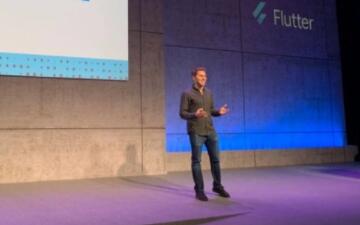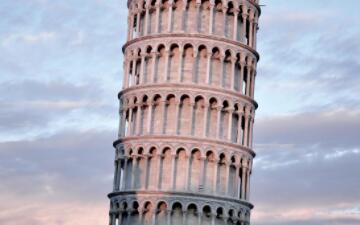Flutter 处理 Overlay 返回事件
在 Flutter 中,我们可以使用 OverlayEntry 实现一个位于顶层的遮罩层。

比如上面的 Overlay 示例效果,可以通过 这段代码来实现
void _showOverlay(BuildContext context, {required String text}) async {
OverlayState? overlayState = Overlay.of(context);
OverlayEntry overlayEntry;
overlayEntry = OverlayEntry(builder: (context) {
return Positioned(
left: MediaQuery.of(context).size.width * 0.1,
top: MediaQuery.of(context).size.height * 0.80,
child: ClipRRect(
borderRadius: BorderRadius.circular(10),
child: Material(
child: Container(
alignment: Alignment.center,
color: Colors.yellowAccent,
padding:
EdgeInsets.all(MediaQuery.of(context).size.height * 0.02),
width: MediaQuery.of(context).size.width * 0.8,
height: MediaQuery.of(context).size.height * 0.06,
child: Text(
text,
style: const TextStyle(color: Colors.black),
),
),
),
),
);
});
// inserting overlay entry
overlayState!.insert(overlayEntry);
看起来一切都很正常,但是如果我们点击一下系统的返回按键,我们看到的结果是
- Overlay 并没有优先消失
- 而是当前的底层界面会退出了。
WillPopScope 管用么
经过验证,WillPopScope 其实也无法拦截 Overlay 的返回事件。因为所处层级不同。
那怎么办
可以借助系统的 SystemChannels.navigation 来实现,在 popRoute 层面去做拦截。
这里有一个库可以解决
dependencies:
flutter:
sdk: flutter
back_button_interceptor: 5.0.2
注意:如果你的 Flutter 适配到了 Flutter 3.0,可以使用最新的back_button_interceptor(6.0.0),否则使用上面的5.0.2版本。
导入包
import 'package:back_button_interceptor/back_button_interceptor.dart';
接入拦截代码
void _showOverlay(BuildContext context, {required String text}) async {
OverlayState? overlayState = Overlay.of(context);
OverlayEntry overlayEntry;
overlayEntry = OverlayEntry(builder: (context) {
return Positioned(
…… some code omitted .
});
// inserting overlay entry
overlayState!.insert(overlayEntry);
BackButtonInterceptor.add((bool stopDefaultButtonEvent, RouteInfo info) {
overlayEntry.remove();
BackButtonInterceptor.removeByName('my_back_button');
return true;
}, name: 'my_back_button');
}
其中
- BackButtonInterceptor.add 用来添加一个拦截器,通常还是需要增加一个 name 用作后续的移除做标识
- 当拦截之后,我们需要添加 overlayEntry.remove(); 用作移除OverlayEntry。 添加 BackButtonInterceptor.removeByName('my_back_button'); 移除当前的拦截器, return true; 表明拦截器处理了该事件。
内部核心代码逻辑实现
/// 添加逻辑
static void add(
InterceptorFunction interceptorFunction, {
bool ifNotYetIntercepted = false,
int? zIndex,
String? name,
BuildContext? context,
}) {
_interceptors.insert(
0,
_FunctionWithZIndex(
interceptorFunction,
ifNotYetIntercepted,
zIndex,
name,
context == null ? null : getCurrentNavigatorRoute(context),
));
stableSort(_interceptors);
SystemChannels.navigation.setMethodCallHandler(_handleNavigationInvocation);
}
/// hook 回掉逻辑
static Future<dynamic> _handleNavigationInvocation(MethodCall methodCall) async {
// POP.
if (methodCall.method == 'popRoute')
return popRoute();
// PUSH.
else if (methodCall.method == 'pushRoute')
return _pushRoute(methodCall.arguments);
// OTHER.
else
return Future<dynamic>.value();
}
/// 弹出拦截逻辑
static Future popRoute() async {
bool stopDefaultButtonEvent = false;
results.clear();
List<_FunctionWithZIndex> interceptors = List.of(_interceptors);
for (var i = 0; i < interceptors.length; i++) {
bool? result;
try {
var interceptor = interceptors[i];
if (!interceptor.ifNotYetIntercepted || !stopDefaultButtonEvent) {
FutureOr<bool> _result = interceptor.interceptionFunction(
stopDefaultButtonEvent,
RouteInfo(routeWhenAdded: interceptor.routeWhenAdded),
);
if (_result is bool)
result = _result;
else if (_result is Future<bool>)
result = await _result;
else
throw AssertionError(_result.runtimeType);
results.results.add(InterceptorResult(interceptor.name, result));
}
} catch (error) {
errorProcessing(error);
}
if (result == true) stopDefaultButtonEvent = true;
}
if (stopDefaultButtonEvent)
return Future<dynamic>.value();
else {
results.ifDefaultButtonEventWasFired = true;
return handlePopRouteFunction();
}
}
完整的示例代码
import 'package:flutter/material.dart';
import 'package:back_button_interceptor/back_button_interceptor.dart';
void main() {
runApp(const MyApp());
}
class MyApp extends StatelessWidget {
const MyApp({Key? key}) : super(key: key);
// This widget is the root of your application.
@override
Widget build(BuildContext context) {
return MaterialApp(
title: 'Flutter Demo',
theme: ThemeData(
// This is the theme of your application.
//
// Try running your application with "flutter run". You'll see the
// application has a blue toolbar. Then, without quitting the app, try
// changing the primarySwatch below to Colors.green and then invoke
// "hot reload" (press "r" in the console where you ran "flutter run",
// or simply save your changes to "hot reload" in a Flutter IDE).
// Notice that the counter didn't reset back to zero; the application
// is not restarted.
primarySwatch: Colors.blue,
),
home: const MyHomePage(title: 'Flutter Demo Home Page'),
);
}
}
class MyHomePage extends StatefulWidget {
const MyHomePage({Key? key, required this.title}) : super(key: key);
// This widget is the home page of your application. It is stateful, meaning
// that it has a State object (defined below) that contains fields that affect
// how it looks.
// This class is the configuration for the state. It holds the values (in this
// case the title) provided by the parent (in this case the App widget) and
// used by the build method of the State. Fields in a Widget subclass are
// always marked "final".
final String title;
@override
State<MyHomePage> createState() => _MyHomePageState();
}
class _MyHomePageState extends State<MyHomePage> {
int _counter = 0;
void _incrementCounter() {
setState(() {
// This call to setState tells the Flutter framework that something has
// changed in this State, which causes it to rerun the build method below
// so that the display can reflect the updated values. If we changed
// _counter without calling setState(), then the build method would not be
// called again, and so nothing would appear to happen.
_counter++;
});
_showOverlay(context, text: 'overlay');
}
void _showOverlay(BuildContext context, {required String text}) async {
OverlayState? overlayState = Overlay.of(context);
OverlayEntry overlayEntry;
overlayEntry = OverlayEntry(builder: (context) {
return Positioned(
left: MediaQuery.of(context).size.width * 0.1,
top: MediaQuery.of(context).size.height * 0.80,
child: ClipRRect(
borderRadius: BorderRadius.circular(10),
child: Material(
child: Container(
alignment: Alignment.center,
color: Colors.yellowAccent,
padding:
EdgeInsets.all(MediaQuery.of(context).size.height * 0.02),
width: MediaQuery.of(context).size.width * 0.8,
height: MediaQuery.of(context).size.height * 0.06,
child: Text(
text,
style: const TextStyle(color: Colors.black),
),
),
),
),
);
});
// inserting overlay entry
overlayState!.insert(overlayEntry);
BackButtonInterceptor.add((bool stopDefaultButtonEvent, RouteInfo info) {
overlayEntry.remove();
BackButtonInterceptor.removeByName('my_back_button');
return true;
}, name: 'my_back_button');
}
@override
Widget build(BuildContext context) {
// This method is rerun every time setState is called, for instance as done
// by the _incrementCounter method above.
//
// The Flutter framework has been optimized to make rerunning build methods
// fast, so that you can just rebuild anything that needs updating rather
// than having to individually change instances of widgets.
return Scaffold(
appBar: AppBar(
// Here we take the value from the MyHomePage object that was created by
// the App.build method, and use it to set our appbar title.
title: Text(widget.title),
),
body: Center(
// Center is a layout widget. It takes a single child and positions it
// in the middle of the parent.
child: Column(
// Column is also a layout widget. It takes a list of children and
// arranges them vertically. By default, it sizes itself to fit its
// children horizontally, and tries to be as tall as its parent.
//
// Invoke "debug painting" (press "p" in the console, choose the
// "Toggle Debug Paint" action from the Flutter Inspector in Android
// Studio, or the "Toggle Debug Paint" command in Visual Studio Code)
// to see the wireframe for each widget.
//
// Column has various properties to control how it sizes itself and
// how it positions its children. Here we use mainAxisAlignment to
// center the children vertically; the main axis here is the vertical
// axis because Columns are vertical (the cross axis would be
// horizontal).
mainAxisAlignment: MainAxisAlignment.center,
children: <Widget>[
const Text(
'You have pushed the button this many times:',
),
Text(
'$_counter',
style: Theme.of(context).textTheme.headline4,
),
],
),
),
floatingActionButton: FloatingActionButton(
onPressed: _incrementCounter,
tooltip: 'Increment',
child: const Icon(Icons.add),
), // This trailing comma makes auto-formatting nicer for build methods.
);
}
}来自:https://droidyue.com/blog/2022/07/17/handle-back-button-click-with-overlay-in-flutter
本文内容仅供个人学习、研究或参考使用,不构成任何形式的决策建议、专业指导或法律依据。未经授权,禁止任何单位或个人以商业售卖、虚假宣传、侵权传播等非学习研究目的使用本文内容。如需分享或转载,请保留原文来源信息,不得篡改、删减内容或侵犯相关权益。感谢您的理解与支持!


